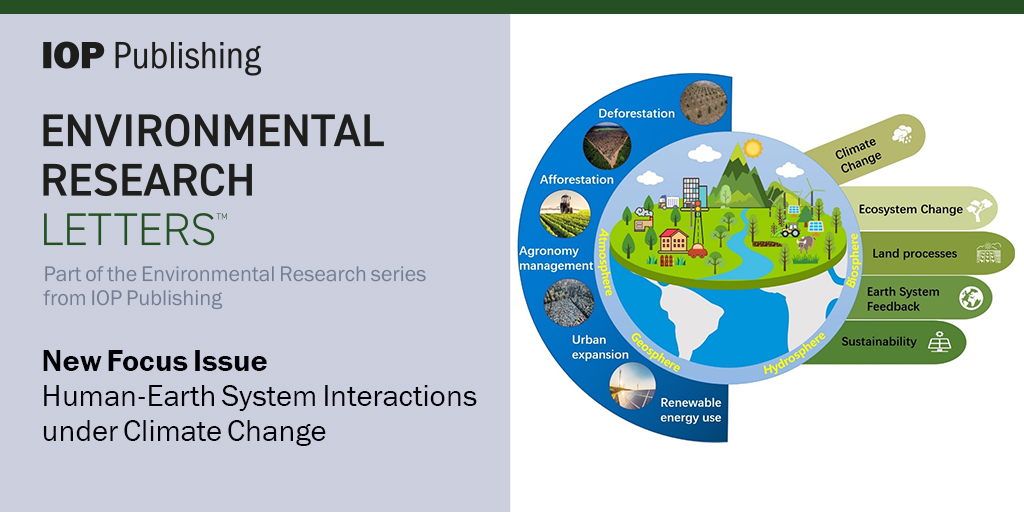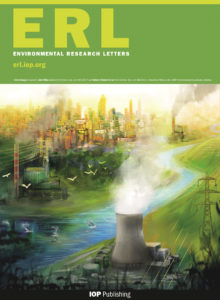ERL特刊征稿|Human-Earth System Interactions under Climate Change

特刊详情
客座编辑
- 李辉东,中国科学院沈阳应用生态研究所
- Minchao Wu,瑞典隆德大学
- TC Chakraborty,美国太平洋西北国家实验室
- Anna Rutgersson,瑞典乌普萨拉大学
- Torbern Tagesson,瑞典隆德大学
- Bing Xue,德国柏林工业大学
- Zhonghua Zheng,英国曼彻斯特大学
主题范围
Human-Earth system interactions play a critical role in global climate and have become increasingly important in recent decades due to the rapid pace of infrastructure and socioeconomic development. Human activities affect ecosystems worldwide. These activities, which include deforestation, afforestation, agronomy and forest management, urban expansion, renewable energy generation, etc., have largely reshaped the global land surface. The significant impacts on global ecological structure and functioning induced by these changes also influence other Earth system components, including the marine system through land-sea-atmosphere interactions and the atmosphere through changes in global heat, moisture, and carbon budgets. Regional and global socioeconomic activities, such as agriculture and energy production, may evolve over time with the natural systems through a wide range of biophysical and biogeochemical feedbacks on the Earth system from global to regional and from seasonal to centennial scales. Human activity, therefore, has become an additional dimension that complicates the existing interactions between components of the Earth system, imposing additional challenges for assessing the tipping points of climate change and for understanding the fate of the Earth system in the future Anthropocene. Therefore, further efforts for better understanding human-Earth system interactions are urgently needed. This requires synergy across scientific disciplines for developing new concepts and/or research methods drawn from multiple domains and perspectives, e.g., from survey data and social science frameworks to Earth observing systems and Earth system models.
This focus collection aims to further understand human-Earth system interactions for better serving regional and global sustainability and facilitating the achievement of UN Sustainable Development Goals. We welcome the latest research advancements in improving our understanding of human-Earth system interactions through state-of-the-art monitoring, modelling, and policy-based analysis.
We seek to address the following key areas, which cover but are not limited to:
- Human-nature coupled ecosystem processes
- Land use change and landscape pattern dynamics
- Ecosystem response and feedback to climate extremes
- Human-induced changes in biophysical and biogeochemical feedbacks in the Earth system
- Ecosystem-renewable energy interaction
- Shipping impacts on the environment and climate
- State-of-the-art methods including Earth observation and modelling for quantifying human-Earth system interactions
- Future socioeconomic changes and feedbacks to the environments
- Ecosystem services, regional planning, and sustainability
投稿流程
特刊文章与ERL期刊常规文章遵循相同的审稿流程和内容标准,并采用同样的投稿模式。
有关准备文章及投稿的详细信息,可以参阅IOPscience页面的作者指南。
作者可登入期刊主页进行在线投稿,在“文章类型”中选择“特刊文章”,并在“选择特刊”的下拉框中选择“Focus on Human-Earth System Interactions under Climate Change”。
投稿截止日期:2023年11月30日。
期刊介绍

- 2021年影响因子:6.947 Citescore: 9.4
- Environmental Research Letters(ERL)以金色开放获取模式出版,作者可选择将原始数据作为补充资料与文章一起发表。所有研究人员可以免费获取这些研究成果。ERL汇聚了关注环境变化及其应对的研究团体和政策制定团体的意见,涵盖了环境科学的所有方面,出版研究快报、综述文章、观点和社论。ERL顺应了环境科学的跨学科发表的趋势,反映了该领域相关的方法、工具和评估战略,得到了来自不同领域的广泛贡献。
